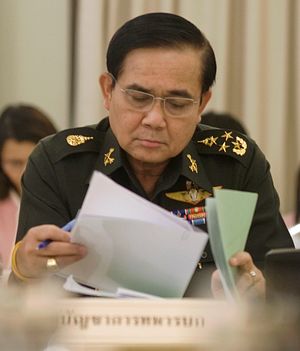Thailand adopted an interim constitution on Tuesday that grants the military junta government — known officially as the National Council for Peace and Order — a wide range of powers. The constitution is being pitched as the first step towards restoring Thai democracy. Following the ouster of the last government under Prime Minister Yingluck Shinawatra in a coup, the military took control of the country. Thailand is scheduled to host an election in October 2015.
The interim constitution allows the junta to rule the country formally until the elections next October. According to the Washington Post, “the junta will continue to hold substantial power even after an interim Cabinet and legislature take office in September.” The interim constitution further legalizes all actions the military has taken since the coup. The takeover from the previous government itself has been deemed legal by the new constitution.
The interim constitution sets out a plan to appoint new members of the National Legislative Assembly (NLA), an appointed legislative body. The NLA will be appointed by the junta and will have the power to elect a new prime minister. The prime minister in turn has the authority to pick a new cabinet. However, under the new interim constitution, members of the junta, including army commander-in-chief General Prayuth Chan-ocha, would theoretically be able to serve as interim prime minister. The constitution seems to have few checks on the power of the junta.
Prayuth is likely to be one of the top contenders for the interim prime minister position. He has broad support within the military and since the junta will be appointing the NLA, it is likely that only candidates with favorable views for Prayuth will be selected. General Paiboon Kumchaya, a deputy army commander, Prayuth is already de facto operating as a prime minister. Kumchaya told the WaPo: “Personally, I don’t see that Gen. Prayuth lacks any qualifications. At this period, it’s like he’s already working as the prime minister … In the past few months, Gen. Prayuth has been doing the job thoroughly, chairing every meeting by himself and running every ministry smoothly.”
A key provision in the interim constitution is that in order for a citizen to be eligible for appointment to the new NLA, he or she has to be at least 40 years old and not have been an active member of any political party over the past three years. The latter condition demonstrates the extent to which the Thai junta is preoccupied with limiting the influence of Thailand’s political parties. Furthermore, Article 44 of the temporary constitution grants Prayuth broad authority. Article 44 allows the leader of the junta (Prayuth by default) “to order, suspend or do any actions he sees necessary for the benefits of the reforms, the unity and reconciliation of people in the country, or to prevent, suspend or suppress any actions that will destroy the peace and order, the national security and monarchy, the country’s economy or the country’s governance, no matter if such actions are taking place in or outside the kingdom.” The document additionally declares that all such actions are legal by default.
Developments since the May 22 coup in Thailand have decisively been undemocratic. It appears that the new temporary constitution only strengthens the hands of the junta at the expense of Thailand’s established political parties.

































